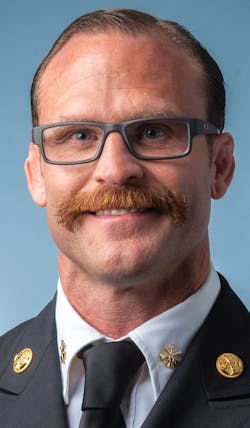Leadership Lessons: Leaders Have Courageous Conversations
In all professions, leaders must have courageous conversations with their team members to help those people to learn and develop. Recently, I witnessed a process that can be helpful to having those conversations. Four words— understand, capable, obstacles and willingness, or UCOW—are the keys to that process. I didn’t coin the acronym nor the phrase “courageous conversations,” but they are very useful on a daily basis.
What is the practical application of the four words? Let’s say that you have an issue that you’re dealing with. One of the first steps is to seek to grasp the matter. That likely is done by having a courageous conversation, and utilizing the four words during the conversation should help you to teach, coach and mentor all at the same time.
Understand
Asking team members “Do you understand the issue at hand?” allows them a chance to explain their view of the issue and gives you a chance to help them to understand your perception of the issue based on information that you received. Team members explaining the issue in a manner that changes the narrative because of a simple misunderstanding can permit the lines of communication to flow more freely, so everyone is on the same page.
Capable
Asking team members “Are you capable of performing this skill or following this guideline?” actually can end up relating to more than just a skill or guideline. It could be almost any issue. A team member’s response of “No” means that there’s an issue that must be corrected, and correcting the issues ensures that the team member can be taught, coached and mentored to a point where that individual can be successful.
If the team member’s response to the question is “Yes,” then the conversation can move on quickly.
However, if the team member’s response is “Yes” but you have information that indicates otherwise, a courageous conversation is needed, and you can turn once again to teaching, coaching and mentoring.
Obstacles
Asking team members “Are there any obstacles that prevent you from performing this skill or adhering to this guideline?” could prompt an answer that indicates lack of training, lack of equipment or lack of leadership, for example, or it could prompt nothing at all. However, if you don’t ask the team members the question, you don’t get to the root cause of the issue.
If there is an obstacle that the department or a person is presenting but no one is aware of it, how do you help to fix the issue? Again, open and clear communication is the way of going about that.
Willingness
When you ask team members “Are you willing to perform this skill or follow this guideline?”, one would hope that they would say “Yes”. What if they don’t believe that the skill or guideline is important or they believe that the skill or guideline is outside of their skill set? That’s valuable intelligence to have. Did the effort to educate them in the area fall short? Did they misinterpret information? You never will know unless you ask and allow open and honest communication in an environment where team members don’t feel demeaned or belittled.
Widely applicable
You can apply UCOW in many situations, from operations to administration and everything in between. For example, someone comes into work late. There’s no reason to be mean and yell at them. Talk to them and teach them. A few easy questions fix the issue:
“Good morning, Recruit Griffin. Do you understand what time that you’re supposed to arrive to work ready for the shift based on our values and policies?”
“Yes, sir.”
“OK, great. Are you capable of arriving to work on time?”
“Yes, sir.”
“Are there any obstacles that prevent you from arriving to work on time?”
“No, sir.”
“Are you willing to arrive to work on time?”
“Yes, sir.”
“Great. Going forward, my expectation is that you arrive on time and are in proper uniform, ready to start our shift together. I’m your officer, and I want to ensure that I teach, coach and mentor you so that you’re successful in your career. Remember, the little things matter.”
Another example: An issue arises regarding stretching a hoseline off of the rig. Again, talk with them and teach them.
“Recruit Griffin, I noticed that you had an issue last shift stretching the hoseline off of the rig. I must help you to improve that skill. Do you understand the proper way of stretching the hose?”
Let the person talk and explain the process, because you might find out quickly that the individual simply doesn’t understand the process. If the person doesn’t know the proper way, your job as the leader is to teach the individual.
If the person does understand the proper way of stretching the hose, your next question is, “Are you capable of stretching the hose?” The individual could say “Yes” or could say “No,” but the answer sets you up for the remainder of the conversation.
“Are there obstacles that prevent you from stretching the hose?”
“Yes, sir. There was a car close to the engine, because we were on a one-way street with cars parked on one side, so there was very little room to maneuver the hose.”
Now, teach them how to do it.
Finally, “Are you willing to perform the skill?” Again, most of the time, the person’s response will be “Yes,” but if you don’t ask, you won’t know.
A building process
The more that you utilize UCOW in a conversation, the more communication and understanding everyone who is involved will have. This is important when dealing with positive and negative issues. Team members want to do well, but if they don’t know or understand and you destroy them when they have a misstep, the opportunity to build trust and build a team suffers. Like one of my mentors says, “When I have a perfect day, I’ll expect you to have one.”
Remember: Understand, capable, obstacles, willingness—and most importantly, teach them as you would hope that someone would be willing to teach you. I know I do.
About the Author

Dr. David Griffin
Dr. David Griffin is the assistant chief of administration in Charleston, SC, and is a Firehouse Contributing Editor He was the operator of the first-due engine on June 18, 2007, when nine of his fellow firefighters perished. Griffin has come through the ranks in operations in every uniformed position, from firefighter to battalion chief and shift commander to his current position, during his 20-year career in Charleston. He has a bachelor's degree in education from The Citadel, a master's degree in executive fire service leadership, and a doctorate of education in organizational leadership and development. Griffin is the author of "In Honor of The Charleston 9: A Study of Change Following Tragedy," among three other books. He is an international speaker and instructor, a certified Chief Fire Officer and Chief Training Officer with The Center for Public Safety Excellence, an IFSAC/Pro Board-certified Fire Officer IV and a graduate of the Executive Fire Officer Program from the National Fire Academy. He is a graduate of Harvard University's Kennedy School of Executive Education program: Senior Executives in State and Local Government and of the Psychology of Leadership program at Cornell University's SC Johnson College of Business. Griffin is the owner of On A Mission, LLC, at drdavidgriffin.com.
